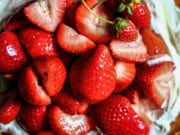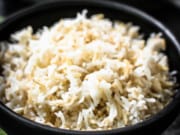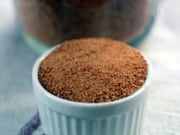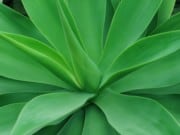Use this G-Free Foodie Guide to help navigate the world of Natural Sugars & Sweeteners.
Agave Nectar: super-sweet syrup that is a bit thinner than honey, made from sap of the blue agave plant. Contains more calories per tsp. than sugar, but ⅔ cup of Agave Nectar can be substituted for 1 cup of white sugar in recipes (other liquids should be reduced by ⅓.) Low on glycemic index (GI). Better for use in drinks & softer foods like custard & cheesecake, but can be used for baking.
Brown Rice Syrup: this mildly sweet golden syrup is made by fermenting brown rice with enzymes. Less sweet than sugar and fairly low on GI, 1 ½ cups of Brown Rice Syrup can be substituted for 1 cup sugar in recipes (reduce other liquids by 2-3 tbsp.) Tends to lend a crunchy texture in baked goods, so it's best used in cookies or granola.
Date Sugar: Date sugar is made from ground dried dates, imparts a lovely, sweet flavor to baked goods. This product doesn't dissolve or melt, so it isn't good for drinks, smoothies or custards. Adds fiber & nutrients found in dates, but will have a strong impact on blood sugar. Cook times should also be reduced by about 10%.
Honey: the work of busy bees has a similar level of sweetness as sugar. Honey ranges on GI spectrum due to changing sources, but can generally be used 1 to 1 as a replacement for sugar (reduce other liquids by ¼ c. for every cup of honey used, and cook time may need to be reduced.) A delicious, healthy & natural alternative sweetener.
Muscovado Sugar: Unrefined and nutritionally richer than other brown sugars, this dark brown product retains most of the natural minerals inherent in sugarcane. A bit coarser and stickier than traditional brown sugar, Muscovado gives a true molasses sweetness to baked goods, sauces & more. Can be used 1:1 for brown sugar, but recipes liquids may need to be slightly reduced.
Organic Granulated Sugar: unbleached & less processed than traditional granulated sugar cane, and must not be made from genetically modified sugar beets. Same GI, flavor & bake times as regular sugar, but retains a bit of the molasses that holds sugar's minerals.
Palm Sugar: made by boiling the sap of coconut-palm tree flowers, offers a delicious sweetness with a hint of caramel flavor. Low on GI scale, use the granulated form for baked goods & savory dishes where the caramel flavor will be welcome. Swap 1 ⅛ cups for 1 cups of white sugar.
Stevia: from the Stevia leaf, available in liquid or powder form. Raw leaves are roughly 60 times sweeter than sugar, concentrated forms range from 100 to 300 times sweeter. Works well in beverages, sauces or puddings, has zero calories and doesn't affect insulin levels. Tricky to bake with and may impart "off" flavors to baked goods.







Let Us Know What You Think